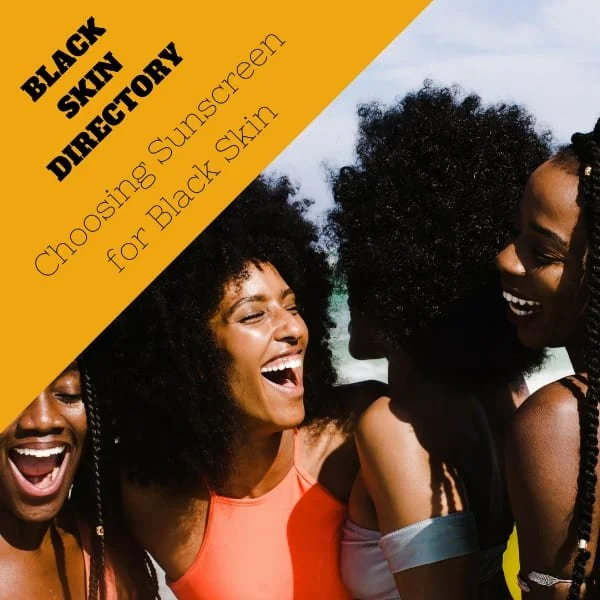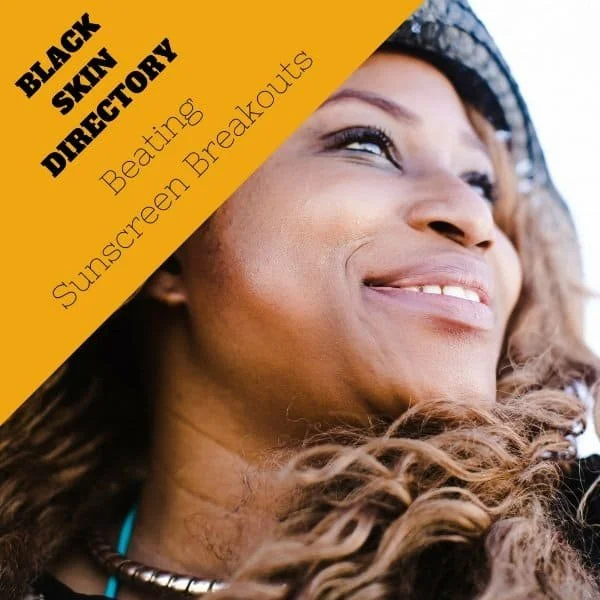Your complete guide to sun protection for skin of colour
Using sunscreen is key in protecting skin from harmful UVA & UVB rays, but how do you know which sunscreen to use?
Melanin will alway afford Black skin some protection from the harmful effects of the sun and whilst Black skin is least likely to develop sun-induced skin cancer, it does still happened.
UVA and UVB rays from the sun are responsible for premature ageing of the skin, causing fine lines and wrinkles, age spots, textural changes and hyperpigmentation. Using sunscreen helps to prevent this.
Additionally, the prevalent use if skincare ingredients such as alpha hydroxy acids and retinoids can increase sensitivity of the skin, making it even more susceptible to sun damage.
How to pick the right sunscreen for you
The formulation behind current sunscreens is so much more sophisticated now, even amongst physical sunscreens. For many options, the tell-tale white cast of zinc oxide and titanium dioxide are minimised or, as with some tinted sunscreens, completely obscured.
If physical sunscreen isn’t for you, then there are chemical sunscreens, which can be topped up with powder sunscreen for better protection– nowadays, there are endless options.
“It’s such a common misconception that people of colour don’t need to wear any form of sun protection. Whilst higher melanin levels can withstand the sun much better, skin is still open to the same risks, from fine lines to skin cancer. I advise a minimum broad spectrum SPF 30 sunscreen.”
— Bianca Estelle, Lead Aesthetician, bea Skin Clinic
How to Pick the Right Sunscreen For You
The formulation behind current sunscreens is so much more sophisticated now, even amongst physical sunscreens. For many options, the tell-tale white cast of zinc oxide and titanium dioxide are minimised or, as with some tinted sunscreens, completely obscured.
If physical sunscreen isn’t for you, then there are chemical sunscreens, which can be topped up with powder sunscreen for better protection– nowadays, there are endless options.
Not all formulas are created equally so it can be difficult to advise you to choose a particular category. The best thing to do is to sample different sunscreens that offer ‘broad spectrum protection of minimum SPF 30 (to protect against burning) and minimum PA +++ (to protect against premature skin ageing)’ with the intention of creating a sunscreen wardrobe with both physical and/or chemical protection options. That way, you’re covered for anything.
Physical Sunscreen
Physical sunscreen also known as inorganic sunscreen has active micronized mineral ingredients; Zinc Oxide and Titanium Dioxide that sit on top of the skin to deflect and scatter harmful UV rays away from your skin. It kind of works like thousands of tiny little mirrors.
However historically they haven’t always looked great on deeper skin as they’ll leave an undesirable white or purple cast on the skin when applied because of the minerals. In addition, when makeup is applied it can subsequently look grey. But now there are some newer physical sunscreens which are very sheer so the cast is really minimal.
Chemical Sunscreens
Chemical sunscreens contain organic (carbon based) compounds that protect the skin from UV rays by a chemical reaction that converts the rays into heat. Compounds such as Oxybenzone, Avobenzone and Octinoxate, Mexoryl SX, Octisalate, Octocrylene, Homosalate, Tinosorb S, Tinosorb M, Mexoryl XL change UV rays into heat, which is then released from the skin, thereby offering sun protection.
Chemical sunscreens have a much thinner consistency and are perfectly fine on black skin tones, leaving no colour residue. However, their longevity ca be questionable though, as they sometimes degrade after absorbing too much UV. They key is to apply frequently, especially if you’re having an active and busy day.
Can Sunscreen Cause Breakouts?
The different sunscreen formulas available from sheer and lightweight lotions to thick and occlusive creams might not always gel well with your skin type. It’s also important to note that’some formulas have silicone in them which form a blanket-like cover over the skin. All of these factors can influence the possibility of a breakout or sunscreen irritation - those little rough bumps and rashes on the skin that look like acne, but don’t respond to acne type treatments.
Here, Black Skin Directory founder and Aesthetician, Dija Ayodele give us her top tips on beating SPF breakouts.
PERFECT YOUR CLEANSE
Firstly, you need to do a thorough double cleanse every evening. The first cleanse is to remove the ‘gunk’ and second cleanse is to clean your skin.
Dija has a tried and tested cleansing routine she loves. ‘I use the DHC Deep Cleansing Oil as my first cleanse – really massaged well into my skin to dislodge make up, pollution and sunscreen. Then I use a warm flannel and water to rinse off.’
Follow with a deep pore facial wash as your second cleanse, taking the time to massage all over your skin to guarantee a good clean. Don't forget to take it up to the hairline and down to the décolleté– you’d be surprised how much make up and oils can travel on your skin. Dija prefers an Alpha Hydroxy Acid based cleanser with lactic or glycolic acid, leaving it on the skin for a couple of minutes to get to work.
GO DEEP
Clogged pores, oil and dead skin cells are the perfect breeding ground for breakouts, so twice weekly deep cleansing masks are perfect to draw out excess oil, keep dead skin cells at bay and pores free of gunk and debris.
Dija’s pick: MZ Skin Instant Clarity Refining Mask, with both Lactic Acid and the gentler Lactobionic Acid to restore radiance to the skin, whilst packing a 10% exfoliating and oil eliminating punch.
DON’T SKIP MOISTURISER
Moisturise and hydrate with a lightweight active laden lotion or serum to prevent the skin going into an oil productive overdrive. Limiting excessive oil on the skin will go a long way in staving off a breakout.
LOOK INSIDE AND OUTSIDE THE SUNSCREEN BOTTLE
Make sure you look into your sunscreen and its ingredients. It may contain an ingredient that irritates your skin, so you may have to switch to a different brand. Sunscreens are available in many different vehicles – gels, lotions, creams, sprays, powder and oil free preparations. Like all skincare, formulation is king. Some will agree with you and some won't. It's a matter of finding out what works for your skin.
Sunscreens we currently love at BSD
This post features several affiliate links, meaning Black Skin Directory will earn a small commission if you purchase through these links. For further information, see our Terms & Conditions.














